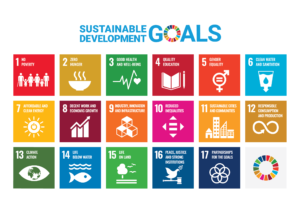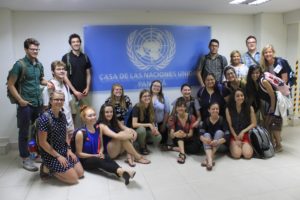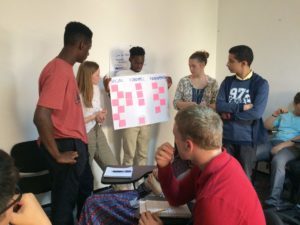“We shall not cease from exploration
And the end of all our exploring
Will be to arrive where we started
And know the place for the first time.”
T.S. Eliot
Travel has always been an important part of the human experience, from our ancient nomadic ancestors, to the Nordic people’s traversal of the northern Atlantic, from the great network of trade routes now known as the “Silk Road,” to the Hajj that millions of Muslims take to Mecca every year. It is an integral part of our reckoning and understanding of the world around us, and our interactions within it.
In modern times, travel has taken on a new identity. It is no longer just for the merchants, pilgrims, aristocrats, or soldiers. It has donned a much more egalitarian look, spearheaded by a new generation of adventure-hungry youths. According to the World Tourism Organization’s (UNWTO) Global Report on the Power of Youth Travel, travelers aged 15-29 accounted for 23% of all international travel in 2015, a number that is forecast to rise significantly come 2020. What’s more, these new generations have started to shift from traditional holiday tourism, to experiential travel, approximately 50% according to the WYSE Travel Confederation. It is at the crest of this wave that Posner Center tenant, Envoys, operates.
Envoys is an organization based in Bogota, Colombia that works with schools to design global education programs for students. Currently, Envoys works with 50 schools throughout the United States and Canada, helping them curate and customize travel experiences.
They have recently launched programs centered around the UN’s Sustainable Development Goals, a shared blueprint for equity and prosperity adopted by all United Nations member states in 2015.

“They’re easy definitions…one of the best things is that they’re now,” says Annie Peuquet, Senior Director, North America at Envoys. “Students can relate to leaders of this movement, they can relate to the content of these programs…Because of the global galvanization around it, this is a very nice way to engage students in something hopeful about the world.”
Since 2018, the organization has led four SDG-oriented programs: Two in Morocco, one in Panama, and one in Chile. Each country has different problems and different priorities when considering the framework of the SDGs, and Envoys’ customized curriculum reflects that. For example, the program in Morocco focused on SDGs 4, 5, 15 and 16: Quality education, gender equality, life on land, and peace, justice and strong institutions.
The first program, which took place in Panama with the Presidents Leadership class at the University of Colorado, featured six goals, which the students selected. After splitting into groups of three, the students worked on their specific goal for the duration of the program, enabling them to understand its full intricacies and various perspectives.

“…[With] all SDG programs, we start in the same way,” says Peuquet. “which is half a day at the UNDP (United Nations Development Programme) in [the destination] country [for the program], and so they hear from the UN, but [from] a local country context team […] they talk about what goals are relevant in this country.“
The local context is an important part of Envoys. Before students even arrive in their country, Envoys provides them with a rigorous round of preparatory coursework, providing them with background information on the country and the SDGs at stake. Once in country, they are tasked with using a methodology called empathy interviewing; a process whereby students research the organizations, list their assumptions, and generate questions off those assumptions.
The next step is intended to provide a variety of diverse experiences for students. In Morocco, students were tasked with working on a farm, exploring the subtle—and not so subtle—ways French colonialism affects Moroccan agriculture, before meeting students at the University of Fez.
Regardless of what activities students participate in, SDG programs always end in the same way: A final policy simulation.

These policy simulations challenge students to combine everything they have learned, and everything they’ve experienced, into a policy towards the achievement or improvement of that goal. For students, this can be rewarding, and inherently difficult.
“Students have always grown up to hear history as truth, and I think that as you engage with different people and engage with different stakeholders, there are complexities that surround those different interpretations,” says Peuquet.
Peuquet also emphasizes that the age group they work with, namely 14-21 years of age, is a critical time for students. They’re starting to develop their views on things, their core values, passions, and what they’re going to stand up for. Travel, by its very nature, challenges and tempers these beliefs.
“There’s going to be realizations when your world view doesn’t match someone else’s,” says Peuquet. “reasonable people can disagree, and that’s ok.“
For the future, Peuquet hopes to continue to scale the SDG program. Since Envoys is primarily a service provider , it is down to the schools to make the choice to pursue these opportunities, but it is an initiative that Peuquet says they will continue to champion, and it is an idea that is gaining a lot of traction.
The SDGs may be immediate and in the now, but their focus is undeniably on the future, and it is the younger generations who will be impacted the most. Too often, their voices are silenced or not taken seriously. The furor that incessantly surrounds Greta Thunberg is proof enough of that. Yet, Envoys aims to make a positive change within that narrative. They trust students with complex issues. They engage them with viewpoints and arguments that are unfamiliar and contradictory to their own. They allow them to take responsibility, to claim stake, and propose solutions to problems that will very much be their burden. Most importantly, they spur them to get involved.
“One of my favorite moments towards the end of the program,” says Peuquet. “We always ask students to complete the sentence: I used to think__ but now I know___. Young people care about these things, and so the more that we can involve students in conversations about the future, of these challenges, then I think the more likely we are to achieve them.”
Click here to learn more about Envoys’ SDG curriculum
